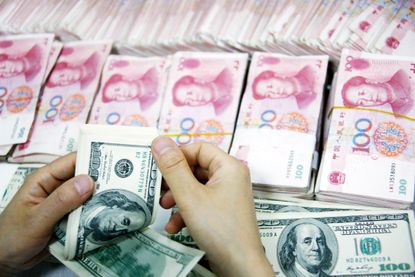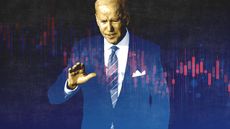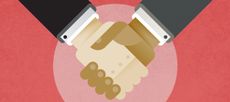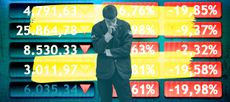China's latest power play comes at the expense of America
Everything you need to know, in three paragraphs

"Historians may record March 2015 as the moment when China's checkbook diplomacy came of age," said Paul Taylor and William James at Reuters. Beijing has spent several years trying to persuade Western nations to join its Asian Infrastructure Investment Bank (AIIB), which will soon open its doors and begin handing out billions of dollars in development loans to fund roads, ports, water and sanitation systems, and telecom projects across Asia. The bank will also not so subtly expand China's influence "at the expense of the United States," which has dominated the international economic system since the end of World War II. The Obama administration has pressed allies in Europe and elsewhere to boycott the bank, arguing that it would have less scrupulous lending and environmental standards than rival U.S.-backed institutions like the World Bank and International Monetary Fund. But last week Washington lost the diplomatic "arm-wrestling match," said Gideon Rachman at the Financial Times. In quick succession, the U.K., France, Italy, and Germany all agreed to become founding shareholders of the AIIB, a sign that they are eager to cozy up to Beijing and its $4 trillion in foreign reserves. Once upon a time, "the world was said to bow down before the mighty dollar. These days, even many of America's closest allies have renminbi signs in their eyes."
This is an impressive "soft-power victory for China," said the editors at Bloomberg View, and "Washington largely has itself to blame." The U.S. has long called on China to take more of a role in international financial institutions, "without making room for it to do so." Congress has repeatedly "blocked efforts to dilute U.S. dominance of the World Bank" or give China more influence at the IMF, where Beijing's voting share is just 4 percent versus Washington's 17 percent. Republicans have also shot down President Obama's attempts to increase U.S. funding for the World Bank and IMF, said Charles Kenny at Bloomberg, leaving those institutions "undersize compared with the demands they face." But if the Obama administration can't persuade the GOP to put up the cash needed to underwrite development projects that will save lives and foster global growth, "it should at the very least get out of the way of other countries willing and able to lead."
The U.S. has emerged from this diplomatic debacle looking "churlish and ineffectual," said The Economist. But it "is not wrong to be suspicious of China's motives." The AIIB is designed expressly "to project Chinese power" throughout Asia, and China has a history of providing international loans that are "opaque, careless of environmental concerns, and shot through with dodgy political dealings." But the best way to address such concerns "is to join the bank and improve it from inside, not to throw brickbats from outside." The fact that so many European countries have now signed on also "makes it more likely" that the AIIB's lending standards will be aboveboard. The U.S. still has the opportunity to become one of the bank's founding members. "That would be the best way to accommodate Asia's massive infrastructure plans — to say nothing of a rising China."
Subscribe to The Week
Escape your echo chamber. Get the facts behind the news, plus analysis from multiple perspectives.

Sign up for The Week's Free Newsletters
From our morning news briefing to a weekly Good News Newsletter, get the best of The Week delivered directly to your inbox.
From our morning news briefing to a weekly Good News Newsletter, get the best of The Week delivered directly to your inbox.
Sign up for Today's Best Articles in your inbox
A free daily email with the biggest news stories of the day – and the best features from TheWeek.com
-
 The real story behind the Stanford Prison Experiment
The real story behind the Stanford Prison ExperimentThe Explainer 'Everything you think you know is wrong' about Philip Zimbardo's infamous prison simulation
By Tess Foley-Cox Published
-
 Is it safe for refugees to return to Syria?
Is it safe for refugees to return to Syria?Talking Point European countries rapidly froze asylum claims after Assad's fall but Syrian refugees may have reason not to rush home
By Richard Windsor, The Week UK Published
-
 Quiz of The Week: 14 - 20 December
Quiz of The Week: 14 - 20 DecemberHave you been paying attention to The Week's news?
By The Week Staff Published
-
 The pros and cons of noncompete agreements
The pros and cons of noncompete agreementsThe Explainer The FTC wants to ban companies from binding their employees with noncompete agreements. Who would this benefit, and who would it hurt?
By Peter Weber Published
-
 What experts are saying about the economy's surprise contraction
What experts are saying about the economy's surprise contractionThe Explainer The sharpest opinions on the debate from around the web
By Brendan Morrow Published
-
 The death of cities was greatly exaggerated
The death of cities was greatly exaggeratedThe Explainer Why the pandemic predictions about urban flight were wrong
By David Faris Published
-
 The housing crisis is here
The housing crisis is hereThe Explainer As the pandemic takes its toll, renters face eviction even as buyers are bidding higher
By The Week Staff Published
-
 How to be an ally to marginalized coworkers
How to be an ally to marginalized coworkersThe Explainer Show up for your colleagues by showing that you see them and their struggles
By Tonya Russell Published
-
 What the stock market knows
What the stock market knowsThe Explainer Publicly traded companies are going to wallop small businesses
By Noah Millman Published
-
 Can the government save small businesses?
Can the government save small businesses?The Explainer Many are fighting for a fair share of the coronavirus rescue package
By The Week Staff Published
-
 How the oil crash could turn into a much bigger economic shock
How the oil crash could turn into a much bigger economic shockThe Explainer This could be a huge problem for the entire economy
By Jeff Spross Published